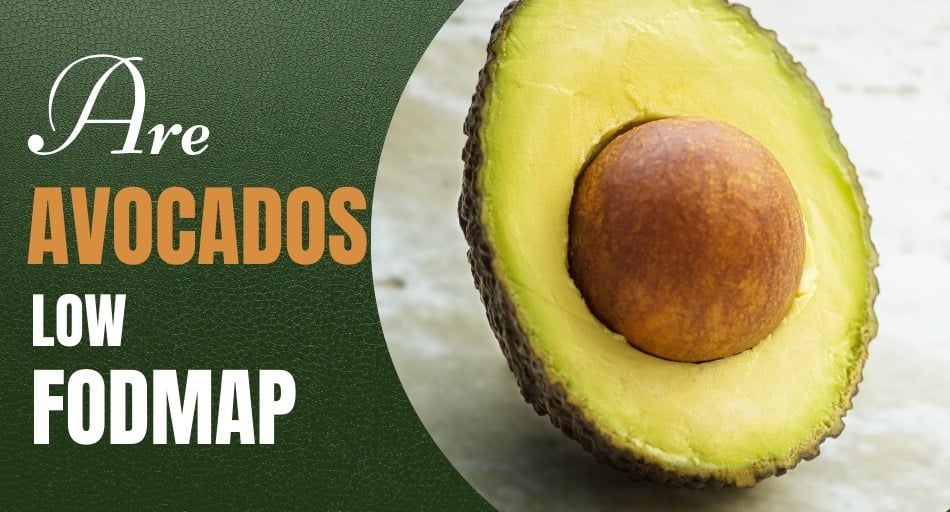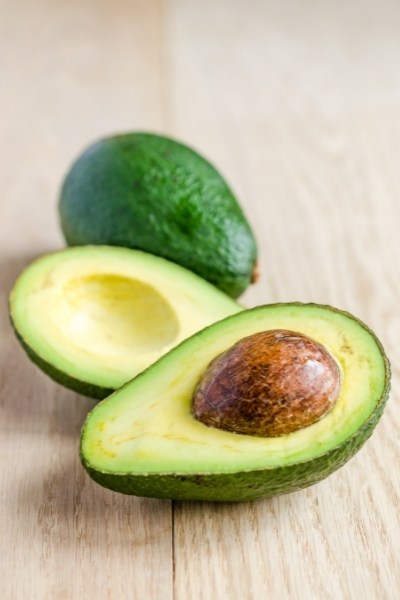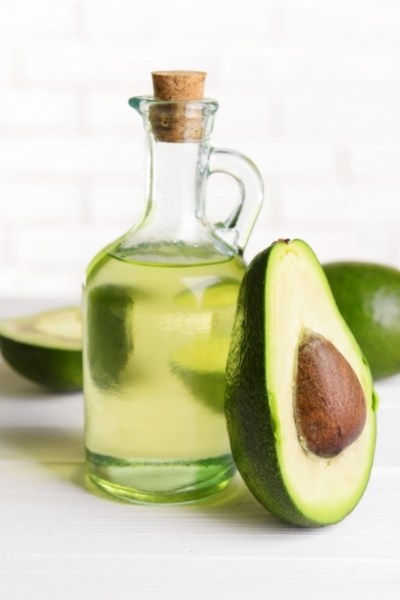A low FODMAP diet is a very good way to manage the symptoms of irritable bowel syndrome (IBS).

This diet limits the intake of indigestible carbs, which tend to worsen IBS and other digestive system issues symptoms.
Because of that, you need to know which foods are allowed on a low FODMAP diet.
A lot of foods contain FODMAPs, but some are very low in them, thus allowed on this type of diet. For example, let’s take a look at a very nutritious food – avocados.
Table of Contents
Are avocados high or low in FODMAPs?
Depending on the serving, avocados can be either low, moderate, or high in FODMAPs. Because of that, consuming small amounts of avocado with your meals that be a good idea.
In addition, avocados are rich in omega-3 fatty acids, fiber, and various micronutrients and antioxidants.
All of these compounds and nutrients help you stay healthy as well as aid in the prevention of health issues. So, eating avocados is beneficial for everyone.
How low in FODMAPs are avocados?

Avocadoes do contain FODMAPs, but how much depends on the serving. For example, half an avocado is considered rather high in FODMAPs.
On the other hand, ¼ of an avocado is a moderate source of FODMAPs, while ⅛ of an avocado (30 g) is considered low in FODMAPs.
This is because avocados are especially high in sorbitol, which is a type of FODMAP that can cause digestive system issues in people with IBS.
So, depending on how restrictive your diet is, you can include small to moderate amounts of avocado in your meals.
Can you eat avocados on a low FODMAP diet?
In small quantities, avocados are OK for people with IBS. What’s more, some people struggling with this condition might not even have any adverse effects after eating this fruit.
This is because avocados contain sorbitol, and not everyone with IBS is intolerant to this type of sugar.
So, it’s important to add any new food to your diet in small quantities to ensure that your body is adjusting to a new diet.
Is avocado oil low in FODMAPs?

Avocado oil doesn’t contain any carbs, so it’s FODMAP-free. Because of that, it can be included in an even the most restrictive low FODMAP diet.
Avocado oil contains a lot of heart-healthy fats and omega-3 fatty acids as well as unsaturated fats. It also provides you with some vitamin E and helps your body absorb other fat-soluble vitamins.
So, it can be a great addition to any dish, especially salads.
Are avocados good for you?
Avocados are very nutritionally balanced, as they contain calories from all three macronutrients: carbs, proteins, and fats.
Firstly, one avocado contains 17 g of carbs, of which 13.5 g is fiber. This amount makes avocados a high-fiber food that helps you load up on this nutrient.
The fiber found in avocados helps digestion and ensures that the food you’re consuming passes through your digestive tract without any problems.
It also helps soak up excess stomach acid, preventing acid reflux and heartburn.
Avocados are also a rich source of fats, providing you with 45% of your daily need for this nutrient in one whole avocado.
While this might seem bad, the fats found in avocados are actually very good for your health.
Avocados are rich in unsaturated fats that may reduce your levels of ‘bad’ cholesterol while improving the levels of the ‘good’ kind. Studies also show that eating avocados can reduce your risk of heart disease as well as other cardiovascular conditions.
So, consuming some avocados as part of your meals is beneficial for the health of your heart.

In addition, avocados provide you with half your daily need for vitamin K.
This fat-soluble nutrient is important for blood clotting, bone metabolism, and blood calcium level regulation.
Getting enough vitamin K each day is linked with a lower risk of extensive bleeding, bone fractures, and hypercalcemia (too much calcium in your blood).
What’s more, since avocados are rich in healthy fats, eating them can ensure that your body is absorbing as much vitamin K as possible since this vitamin dissolves in fats.
Eating avocados can also be exceptionally good during pregnancy. This is because a single avocado contains 41% of your daily need for folate, also known as vitamin B9.
This micronutrient is crucial for the formation of red blood cells and for healthy cell growth and formation.
When it comes to pregnancy, getting enough folate reduces the risk of birth defects of the brain and spine.
So, it’s often included in prenatal supplements, but it’s always best to get most of the nutrients you need from fresh produce like avocados.
Avocados are also a potassium-rich food. This means that eating this fruit can help offset the negative effects of sodium on your blood pressure.
In fact, getting enough potassium lowers your risk of heart attacks and strokes.
Potassium also works as an electrolyte, maintaining fluid balance in your body. It’s also responsible for muscle contractions and nerve signals.

Just like all other fresh veggies and fruits, avocados are an excellent source of powerful plant compounds and antioxidants.
These substances protect your cells from free radicals and oxidative damage to your cells.
Thanks to that, you’re at a lower risk of several chronic conditions, including diabetes, heart disease, and even certain forms of cancer.
So, as you can see, adding avocados to your diet, even in small quantities, can bring wonderful health benefits.
Conclusion
Whether avocados are low in FODMAPs depends on the serving you’re consuming. For example, a whole avocado is very high in FODMAPs, but just 30 g of this fruit is low in these indigestible carbs.
So, always make sure to consume an appropriate serving.
What’s more, avocados are an excellent source of nutrients like fiber, antioxidants, vitamin C, vitamin K, folate, potassium, copper, and many more.
All of them help you stay healthy and prevent various conditions from developing, making avocados a wonderful addition to any healthy, balanced diet.
Sources: Nutrition Data, Monash University, PMC, and National Library of Medicine
